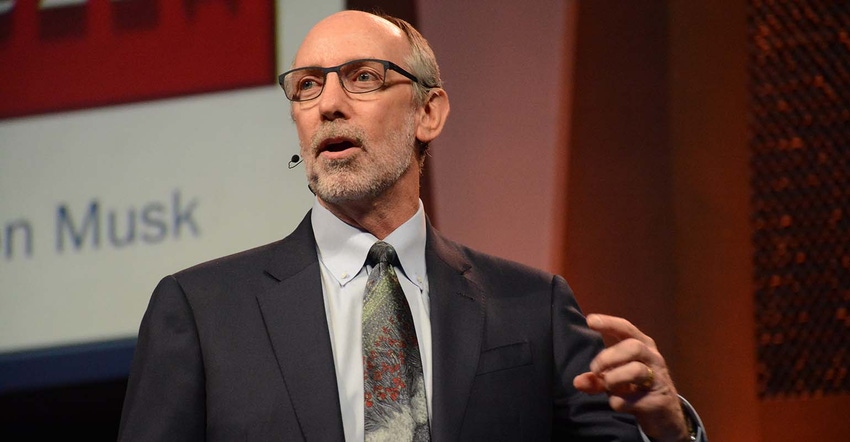
At Apple, he met with Steve Jobs every day. At Tesla, he reported directly to Elon Musk.
You may have never heard of George Blankenship, but as a former executive at GAP, Apple, and Tesla, he helped reinvent the consumer world as we know it today.
Self-described as "the luckiest man on the planet,” Blankenship spoke to an audience of about 2,500 at this week’s Alltech One conference held in Lexington, Ky. His message: someone will disrupt and redefine your industry. Whoever does is going to hold the world in the palm of their hand.
That was the case with Apple, a failing computer company in 2001 before Blankenship arrived as senior executive of real estate. The first thing he did was evaluate how people thought about Apple products. He went to local stores, watched people buy computers – and didn’t like what he saw.
‘I don’t want one’
“I watched for hours to figure out how people think about Apple products,” he recalls. “In 2001, the answer was: ‘I don’t want one,’ and we had to figure out why.”
Blankenship discovered consumers believed Mac computers were only for creative types; that they were too expensive, and that they did not run Microsoft office. People believed there was no software for the machines.
So Apple decided to open stores in high traffic shopping centers – in effect, they ambushed customers. They created the “Genius Bar” where customers could get help on hardware and software. Laptops would sell out in days. Even so, the press wasn’t impressed. A Business Week writer predicted Apple, within two years, would give up on “a painful and expensive mistake.”
Instead it was the beginning of a revolution, in part driven by CEO and founder Steve Jobs’ vision to give people not just products, but experiences.
Apple launched the ipod, a handheld digital music player that allowed the consumer to keep 1,000 songs in their pocket. Although pricey at $600, the ipod became the ‘it’ thing to own – people knew you were cool from the white earbuds. In 2004 Apple hit big again with the ipod mini, an even smaller digital player that could hold 1,000 songs and was sold in multiple colors, with a price tag of just $250.
“We could not keep it in stock,” Blankenship says. The iPod revolutionized the music industry. Artists and record companies were suffering from customers illegally sharing music online. By charging a modest fee of just 99 cents per song, it allowed people to purchase only the music they wanted.
Instead of ‘I don’t want one,’ people started saying they had to have one - even if it meant standing all night in a line. Since those early days, over 35 billion songs have been legally paid for and downloaded at the iTunes music store.
But Jobs and Apple weren’t finished. In 2007 the company launched the iPhone – and Apple stock took off.
“People were camping out in front of stores to get an Apple product that they had never even seen,” Blankenship says. The iPad came along in 2010, and together, these products “changed the way we communicated with each other and how we organized our lives.”
Most recently Apple launched the Apple watch. And although it has sold 20 million units, it’s perceived as less than successful. “Keep an eye on it, because in the future this is how people will get into their homes, how they will communicate, turn on the lights, and do many other things,” says Blankenship.
Disruptive devices
Each of those products were disruptive and revolutionary, but for different reasons.
“The app store made your phone fun,” says Blankenship. “’There’s an app for that’ became an imbedded part of everyone’s life.” Android users can now choose from 2.8 million apps while Apple users can choose from 2.2 million apps.
These devices became vehicles for social media. “What would Facebook or Twitter, be without a smart phone? They wouldn’t really exist,” says Blankenship. “The iPhone has become an integral part of your life,” he adds, describing a story where a man went into full-blown panic when he discovered he left his phone at a restaurant. “That’s disruption.”
No need to check out
Smart phones helped make Amazon into the largest internet-based retail store on the planet. With an Amazon Prime membership your phone will tell you exactly where your package is in the delivery process.
What’s next? Now Amazon is opening brick and mortar stores with Amazon Go technology. This automatically detects when products are taken from or returned to the shelves and keeps track of them in a virtual cart. You pick up items, put them in your cart, and leave.
“They found out people don’t like checking out,” says Blankenship. “You get a picture on your phone of the item and purchase price and your credit card is charged.”
Blankenship believes these companies transformed their industry through disruption – and by making the impossible possible.
“To change the world, sometimes you feel like you have to do the impossible,” he says. ”It’s not impossible - it just hasn’t been done yet. Somebody is going to do it.”
In part two I’ll report on Blankenship’s wild ride with Tesla, the world’s leading electric car company
The opinions of the author are not necessarily those of Farm Futures or Penton Agriculture.
About the Author(s)
You May Also Like






